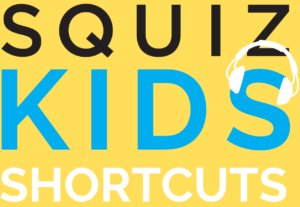
All About Autism
Comprehension Activities
LINKS:
What it’s like to be overwhelmed by your environment: https://vimeo.com/52193530
Temple Grandin on her brain as a search engine: https://www.youtube.com/watch?v=Ifsh6sojAvg&t=86s
How to be a good friend to someone with autism: https://www.milestones.org/get-started/for-community-at-large/interacting-with-autistic-people
EPISODE TRANSCRIPT
It’s a common disability, and some people call it their superpower… Boys are four times more likely to be diagnosed than girls… and some people who have it, have no interest in a cure. This is your Squiz Kids Shortcut to Autism—the podcast where we dive into the who, what, when, where, why and how of the big news stories. I’m Amanda Bower.
And I’m Bryce Corbett.
Bryce, April 2 is World Autism Awareness Day, but in Australia, organisations that support people with autism say it isn’t enough to just be aware … and this year they’ve changed the name to Autism UNDERSTANDING Day. They’re hoping that once people understand more about this common disability, they’ll be more understanding – meaning patient and kind – to the many people who have it.
Today, we’ll take you through WHAT autism is… WHO are some famous people on the autism spectrum and HOW to be a good friend to someone who is autistic.
Listen carefully – there’s a S’quiz at the end!
WHAT
Well, Bryce, let’s start with what autism is NOT. It is not a disease that you can catch; and it is not a condition that you develop later in life. It’s something you’re born with. It’s really just a part of who you are. It’s a condition that affects how you think and feel… how you interact with other people… and how you experience the world around you.
That does make it tricky to define … does every Autistic person experience the world in the same way?
No, not at all. That’s why it’s officially called Autism Spectrum Disorder… no two people on the autism spectrum are alike. A spectrum is a range. If you think about the colour red, it ranges in a spectrum from the palest blush of pink all the way through to the darkest blood red. There are people with autism who are intellectually extremely gifted – some people think Einstein was probably on the spectrum—and others who are severely intellectually challenged. There are people with autism who are stand-up comedians, and there are people with autism who cannot talk.
That’s a spectrum alright… and I can see how it makes understanding autism tricky, if no two autistic people are alike. You mentioned that autism also affects how you interact with people?
That’s right, often autistic people are quite overwhelmed by busy, complicated social situations … they can find all the noise too much… they can have trouble understanding sarcasm or making small talk…. and they may not make eye contact with someone who’s talking, even though they’re listening. One thing many autistic people are known for is being very direct and honest when they communicate.
That’s a good thing! Being direct and honest?
Absolutely, although sometimes non-autistic people avoid telling the whole truth to save someone’s feelings. For example, my husband is on the autism spectrum, and once when I asked him if a new pair of jeans made by bum look fat, he said “no fatter than usual.” Now, he was being very direct, and completely honest… but I can’t say it made me feel great. Then again, when he does give me a compliment, I know he’s not just being polite!
Now you also mentioned that autism affects how people experience the world around them. What does that mean?
Well, often autistic people are extremely sensitive to noises, smells, tastes, touch… you might see kids at school who wear headphones in the classroom to try to turn down some of that noise… autistic people might cut the tags off their clothes, because they can’t stand the feeling of them rubbing on their skin… they might simply not like to be touched. I’ve popped a link in your episode notes to a two-minute animated film that I think really helps us to understand what it might feel like to be overwhelmed by the everyday environment… I highly recommend it.
So Amanda, how common is Autism Spectrum Disorder? WHOM might we have heard of who has it?
WHO
At least 1 in 70 Australians is diagnosed with autism spectrum disorder, and boys are about four times more likely to be diagnosed with it than girls. And before you ask why, Bryce, experts aren’t sure yet if that’s because boys are actually more likely to be born with it, or if it’s just that boys are more likely to be taken to the doctor when they display symptoms of it. Girls with autism are less likely to have challenges with behaviour, and so their families may not seek help and get a diagnosis.
Right…
As for the question of whether you might have heard of anyone with autism, I’m going to bet everything in my bank account that you have. . Have you heard of Elon Musk?
Um, yes. The billionaire behind Tesla and SpaceX? I remember he hosted the American comedy show “Saturday Night Live” not so long ago…
And he made jokes about how he wouldn’t make much eye contact with the cast. Then there’s Greta Thunberg… I’m sure you’ve heard of her?
Of course – the Swedish teenaged climate activist.
She calls autism her “superpower.” Autistic people can have a very deep, long focus on a specific interest area, and often see situations in black-and-white. Greta says that’s what’s helped her see the climate crisis in stark terms, and focus on it for such a long time. There are lots of other examples of famous people on the spectrum, Bryce, but I want to leave you with one more… Temple Grandin.
She’s an American professor of animal science, right?
That’s right. She didn’t talk until she was almost four, and back in the early 1950s, when she was a kid, doctors told her parents that it would be better if she was put into an institution. Her mum refused.
Wow… and now she’s a professor?
Yup. I’ve put a great animated video in your episode notes of her talking about her autism, and how her beautiful brain works – she describes it as a visual search engine. And she says in the video that if someone came up with a cure, she’d have no interest. She’s also convinced that Einstein, Mozart, and lots of the world’s creative people were somewhere on the autism spectrum. Which doesn’t mean that everyone famous is autistic, of course, just as it doesn’t mean that all 350,000 autistic Aussies are destined to be famous!
350,000… it seems to me that we all probably know someone on the autism spectrum… so HOW can we be good friends for them?
HOW
That’s such a great question, Bryce. We all have different kinds of friends with whom we play differently … you might have your friends you play footy with, where you push and shove them on and off the field, and you might have a different friend who wouldn’t like to be handled that way.
That’s for sure.
And your autistic friends are all individuals, so there aren’t any strict rules on how to be a good friend. Some guidelines are the same for any friendship: be patient, be compassionate, try to find shared interests. Then there are some that are more specific to autistic people – like, many would prefer clear choices. Instead of saying “what do you want to do” you might go instead for “do you want to walk, or ride our bikes?”
And I’m guessing that if they don’t make eye contact while you’re talking, you shouldn’t take that personally.
Exactly! And if they’re someone who seems uncomfortable making conversation, make an effort at school to involve them in small group conversations.
I guess that way, you’re building up their confidence.
Absolutely. Many autistic people don’t always understand some of the unwritten rules of friendship – like taking turns when you’re playing. So it help to explain those rules clearly. And if you are having a friend over to play, keep in mind that autistic people may get really upset when plans change, or don’t go according to the plan. So try to minimise that.
And if you have a friend who doesn’t like lots of loud noises, I guess you can do really simple things, like not crank the music or TV up when they’re over at your house.
Exactly. I’ve popped a link in your episode notes with some other guidelines – but actually, there’s no harm in just asking an autistic person—or, if they’re nonverbal, their caregiver—how you can be a better friend to them. They’re sure to have some tips for you. In fact, Bryce, some businesses have done just that … and now there are museums and supermarkets with “quiet hours” where they turn off music and tone everything down, and shoe and clothing shops that offers appointments outside of regular hours for autistic kids. Microsoft runs Minecraft workshops for kids on the autism spectrum; and Surf Lifesaving Australia has an inclusive beaches program that works to help autistic people learn to be safe on the beach, and join their local club.
As people understand more, they’re more able to help. Which is why it’s great that you, Squiz Kids, now know a whole lot more about autism.
The S’Quiz
This is the part of the podcast where you get to test how well you’ve been listening…
1. What did Elon Musk say he wouldn’t make a lot of on a TV show?
2 Name one of the three famous people we talked about who are on the autism spectrum.
3. How old are kids when they get autism?
